Known as “the quiet one” of The Beatles, Harrison’s first published composition was ‘Don’t Bother Me’, which he wrote while ill in a hotel room in Bournemouth in the summer of 1963. It appeared on their second album With The Beatles.
Harrison was later dismissive of Don’t Bother Me, saying “It was a fairly crappy song. I forgot all about it completely once it was on the album… At least it showed me that all I needed to do was keep on writing and then maybe eventually I would write something good.”
During The Beatles’ first US tour, Rickenbacker gave Harrison a 12-string electric guitar – a 360/12 model. The instrument became characteristic of The Beatles early to mid 1960s sound, particularly on the A Hard Day’s Night album, and influenced many other bands including The Byrds.
Harrison sang at least one song on all The Beatles’ albums, though as a songwriter he remained in the shadow of Lennon and McCartney. Following ‘Don’t Bother Me’, his next self-penned songs were ‘I Need You’ and ‘You Like Me too Much’, on 1965’s Help! album.
Indian music
George Harrison’s interest in Indian music was awoken by a scene in the Help! film. While making the film, a Hindu devotee gave each member of The Beatles a book on reincarnation, which led to a fascination with many aspects of Eastern religion, culture and philosophy.
The Byrds’ David Crosby introduced him to the music of Ravi Shankar during a US tour in 1965, and he became fascinated by the sitar. He became friends with Shankar, who became his sitar teacher.
Harrison became the first Western musician to play a sitar on a pop record. The song was ‘Norwegian Wood (This Bird Has Flown)’, on the 1965 album Rubber Soul.
After ‘Norwegian Wood’ I met Ravi Shankar in London for dinner. He offered to give me instruction in the basics of the sitar. It was the first time I had ever really learnt music with a bit of discipline. Then I listened to Indian music for the next two years and hardly touched the guitar except for recording.
For 1966’s Revolver he recorded ‘Love You To’, which featured no Western instrumentation. Following the recording of that album, he went on a pilgrimage to India with his wife Pattie. The couple had met during the filming of A Hard Day’s Night, and married on 21 January 1966.
Pattie introduced George to transcendental meditation, and in 1968 they, along with the rest of The Beatles and their partners, travelled to India to study with Maharishi Mahesh Yogi. Although the band later fell out with the Maharishi, Harrison continued his interest in Eastern philosophy. He embraced the Hare Krishna tradition, and in 1969 produced the single ‘Hare Krishna Mantra’ by the Radha Krishna Temple.


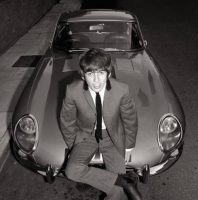
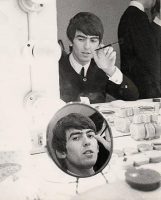
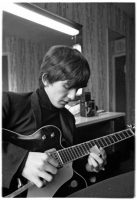

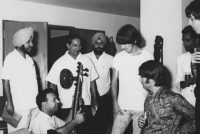
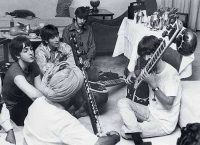
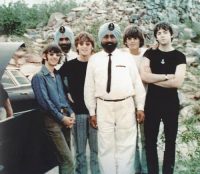
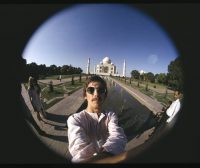
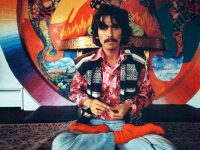
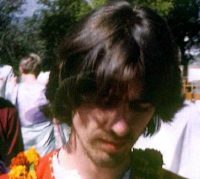
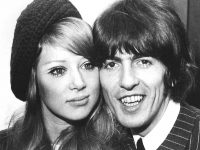
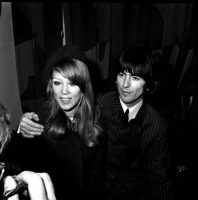
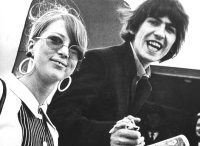
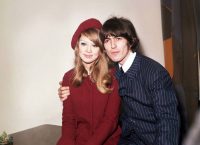
He WAS an academically gifted child, that’s how he got into the institute. He hated the school and the teachers.
but apparently some of his school friends said he was thick. I think he just couldn’t be bothered but that is what some people said
Of course I love the Beatles–they are my time–George was one of the greatest in Rock and Roll History in so many ways he just was an example to all rock and roll lovers and musicians–I truly idolized him as the great human being and artist he really was—Theres really not more to say -Truly one of the greatest–Oh to me there is NO best–But there are many greats! George was one of those
Remember George for his beautiful spirit, struggle to understand the meaning of life, and amazing music. I listen to his music and most days hear something new in it; and I look at my original photos from Shea, and think, “Never Without You.” Blessings to Dhani and Olivia.
An honorable man .. a guy who stand next after Abe Lincoln ..
Yes, a real American. LOL!!
“Most embarrassingly, George, Ringo and Yoko all sued Paul in 1985, when they discovered that he was making more from the group’s records than they were” –
-Yup, acted like a real American 🙂
But he wasn’t American though…
He was British, I thought everyone knew that.
Read this snippet in a BBC article today:
“Meanwhile, George spent years sniping at Paul in public. The two men briefly reunited with Ringo in the mid-90s, but George soon pulled the plug.
Most embarrassingly, George, Ringo and Yoko all sued Paul in 1985, when they discovered that he was making more from the group’s records than they were.”
(http://news.bbc.co.uk/today/hi/today/newsid_8243000/8243561.stm)
Was wondering if you could shed some light, particularly on George’s sniping at Macca.
I’m sure the examples are out there in interviews from the time, but I don’t have any to hand. This extract from the Anthology book (2000) should explain the situation though:
“Personally I’d found that for the last couple of albums – probably since we stopped touring – the freedom to be able to play as a musician was being curtailed, mainly by Paul. There used to be situation where we’d go in (as we did when we were kids), pick up our guitars, all learn the tune and chords and start talking about arrangements.
“But there came a time, possibly around the time of Sgt Pepper (which was maybe why I didn’t enjoy that so much), where Paul had fixed an idea in his brain as to how to record one of his songs. He wasn’t open to anybody else’s suggestions. John was always much more open when it came to how to record one of his songs.
“With Paul, it was taken to the most ridiculous situations, where I’d open my guitar case and go to get my guitar out and he’d say, ‘No, no we’re not doing that yet. We’re gonna do a piano track with Ringo, and then we’ll do that later.’ It got so there was very little to do, other than sit round and hear him going, ‘Fixing a hole…’ with Ringo keeping the time. Then he’d overdub the bass and whatever else.
“It became stifling, so that although this new album was supposed to break away from that type of recording (we were going back to playing live) it was still very much that kind of situation where he already had in his mind what he wanted. Paul wanted nobody to play on his songs until he decided how it should go. For me it was like: ‘What am I doing here? This is painful!’
“Then superimposed on top of that was Yoko, and there were negative vibes at that time. John and Yoko were out on a limb. I don’t think he wanted much to be hanging out with us, and I think Yoko was pushing him out of the band, inasmuch as she didn’t want him hanging out with us.
“It’s important to state that a lot of water has gone under the bridge and that, as we talk now, everybody’s good friends and we have a better understanding of the past. But talking about what was happening at that time, you can see it was strange.”
—
As for the court case, on Monday 25 February 1985 it was reported that George, Ringo and Yoko filed an $8.6m lawsuit against Paul for breach of contract, alleging that he was earning a “preferential royalty from Beatles records to the others, as an incentive for him to re-sign with Capitol as a solo artist.” McCartney’s lawyers admitted this was true, but pointed out that Capitol did not decrease the royalties of the others.
Thanks for the update Joe, and kudos on the site.
Some of George’s recollections may have been exaggerated and it was not very nice for him to say that Paul was curtailing his freedom to play as a musician. They did not stop recording basic tracks with all four of them in the same room altogether (listen to the outtakes for “Lovely Rita”, “Glass Onion” and “Happiness is a Warm Gun”) and don’t forget, drugs were not going to help their long-term memories.
It is tempting to pigeon hole any of the four into pre-determined ideas of their personalities etc., and when it comes to George it’s easy to see him as a gentle soul.
But one ought to remember that at the time of John’s death, he and George were not on speaking terms at all.
Something that apparently cast a shadow over George’s final years.
Point being – they were just blokes – incredibly gifted and talented blokes but filled with all the human flaws the rest of us have.
There is a Rolling Stone interview in the 1980’s in which George stated that he visited John in the Dakota in the late 1970’s. Both guys felt constrained in their conversation due to Yoko’s presence and that John appeared to be trapped in the domestic situation.
What I know about George and Yoko’s relationship is that George never really liked her. Am I right?
i was only little when he died but i just really wish he was still alive. he was a great and inspiring man who changed many peoples lives along with all the other beatles. life is precious and he knew it was close to the end for him.
I just discovered your website last couple of days and it’s fantastic.
I was wondering about same question Wes did. Because it’s strange that, after The Beatles break up, George, John and Ringo worked together in their albums. In fact, Ringo worked with everyone ’til this days.
But Paul was another story. I assume George and John never invited him to play again in their albums. Only Ringo. And I don’t know if Paul did invite any of them to play in his albums.
An interesting story to write would be The Beatles relationship after The Beatles.
Who visited who? How often? How much time did George need in order to forgive Paul? And forgive him for what? And his distance with John after Imagine was caused by the Concert for Bangladesh, when he did invite John but without Yoko? For example: what do we know about the visits they did to each other in the 70’s? The famous story of Paul and John with Saturday Night Live… If they spent the whole day together, how it was like? (because the movie Two of us is a fiction about it) Or the scene in the movie of Linda McCartney Story, where the visited john and Yoko on Christmas and they almost didn’t talk at all.
Because it seems like George was particularly over-sensitive and resented things for many years. And Paul was his friend since childhood. But, on the other hand, it seems like Paul realy peased everybody off for a really long time and no just once.
Ringo was the one who achieved something the others couldn’t: be the link between them, be the union between divided parts. It’s a beautiful characteristic of a leader, far away from the cold results. It’s a shame he seemed to stop trying.
Somebody has more about this topic?
Thanks!!!!!!!!!
Well JM, the not talking phase between friends, siblings, or relations can go on for a long time. A unifying presence such as Ringo can be nullified over time by a number of reasons such as having his own problems and just being fed up with trying for some kind of reconciliation. The differences in personality traits of each former Beatle was a huge barrier to overcome. The deaths of John and George could also inhibit talking things out due to shock with tangible regrets to follow. The Beatles, after all, were only human.
The “not speaking” phase between people who actually love each other can end in a heartbeat when trouble hits. It was Paul McCartney who provided the house in Los Angeles for George Harrison when he was dying of cancer so George could be close to his new cancer treatments at UCLA. It was Paul’s house which George actually passed away in.
Chevron, Glad to see people still add info on here! I didn’t know Paul provided the house for George etc…. thanks for that bit of info!!!
I’d love to know the answers to all of these! Is there a book that one (or more) of them has written that is an authorized biography of how things went from their particular point of views? I’ve read a lot of stuff over the years but I never know whether it is just rumor or direct from one of the Beatles themselves.
First book that comes to mind is “The Beatles Anthology”. Then the next one could be Paul’s “Many Years From Now” that he co-wrote with Barry Miles in 1997.
I live in Southern Illinois and went to Benton yesterday. George and Peter visited their sister Louise there in 1963. They erected a plaque there honoring his visit 50 years ago. It was awesome! Louise was there speaking and signing autographs. George enjoyed his stay here. He stayed for two weeks and went camping, played with the Four Vests at the local V.F.W. and bought a guitar in Mt. Vernon. I loved the Beatles and especially George. I think he got the short end of the stick when it came to putting songs on their albums. John once said of Abbey Road, “The two best songs on the record are George’s.” (Here Comes The Sun, and Something) All those years ago…my, my.
What about “Do you want to know a secret ” and “I’m happy just to dance with you” as early signs that his songwriting was on par with the more celebrated duo?
He didn’t write either of those songs.
Right those were Lennon
Poor Lennon. After McCartney´s “Yesterday”, most people for many, many, many years believed that McCartney was the composer in The Beatles, and today many people believe that Harrison composed “Do You Want To Know a Secret” and “I´m Happy Just To Dance With You”.
“Poor Lennon”.
Oh, yes, Johan. The whole world has just totally forgotten poor John
over the years…..
Tom’s was a simple MISTAKE – no conspiracy involved! George sang them, and he assumed George wrote them. Big deal!
You really need to seek help. Don’t you get tired of this silliness?
George was my all time Fave Beatle. Always was and always will be.
I can’t believe that “I” one of the biggest Beatles fans in the world, did not know that the remaining 3 Beatles played on this song????? It should be right up there with “Free As A Bird” & “Real Love” as far as Beatles songs go!
What song? This is an excerpt about George Harrison. There never was a song called “George Harrison”. And which “remaining 3 Beatles” do you mean? Only 2 are left. Sometimes I wonder about people and their reading skills.
Dear Beyondperplexed,
Why insult someone just because you don’t understand the question? I believe Bongo was inquiring about the song “All those years ago”.
It’s unbecoming to insult each other on this awesome and very informative website.
This is really a great site, I’ve never seen it before, but so glad I’ve found it……. It’s a wealth of knowledge, thank you….
“Young Blood”(recorded at 1 june 1963 for “Live at the BBC”) is George Harrisson singing in a way unknown after this period. He performs in a great way as good as John and Paul. He seams very happy with his voice, has a large tessitura. So I ask if somebody may explain what happened to him after that time.
(Sorry, I am French and like most of us I am very bad in other Languages but very close to England!) Thousand Thanks for reply!
Violet
I just read that a memorial tree that had been planted in George Harrison’s honor was killed by beetles.
I don’t know whether to cry or laugh.
Bet George would laugh.
aren’t Paul and Ringo going to replant another tree?
I think it would be appropriate to plant a weeping Atlas cedar to commemorate George since this tree is mentioned in one of his finest songs ‘Beware of Darkness’, although the climatic conditions in LA may not be suitable where the dead memorial tree was located.
Is is true that George once cheated from Pattie with Ringo’s first wife?
Yes it is true, Apparently John was furious with him about it and that it put a real strain on their relationship.
Harrisons tracks are incredibly underrated and underplayed due to in part the massive amount of songs the mccartney, lennon songwriting pact put out. Only a northern song should have taken when im 64s place. I feel some of the most overlooked harrison tracks include long, long, long , blue jay way. and old browne shoe. I suppose the upside to him only getting two tracks per album, except on pepper, is that he had so many perfect tracks that made all things must pass the best solo album by any beatle.
I was aware of the best group the world has ever known ,and in my opinion will ever know in my youth. As The Beatles they were four of the most talented musicians in the world that happened to bump into each other at this time and place in history. George was was a silent master just at rest until his time came. And come it did. What can you say? Absolutely nothing. Just be glad you were here when they were Fab.
I love you George. You left us way too soon.
I always liked Don`t Bother Me, thought it was one of the better songs on With The Beatles.
Don’t Bother Me was the first song George ever wrote, amazing no? He was in bed with a cold in Bournemouth, they were all supposedly on holiday, and Paul had told him he’d make more money if he got into songwriting. So, in his bed, feeling yucky, on one of his few holidays of the early days, he wrote how he felt. Pretty cool. not a bad beginning at all.
Another one of the problems George had with Paul and John was that he was the “little kid”; in teenage years, to be a year or three younger than everyone else makes a big difference. I saw some video from “Anthology” and the three were at Friar Park playing and reminiscing and Paul kept showing off and bossing everyone around. Imagine bossing George around in his own studio, in his own garden. One can see George getting more and more fed up but he was polite, so that by the end of the video, one can see on George’s face that he had a gullet full and was ready to toss McCartney, film crew and anybody else out into the street!
Meeka, you make me see I need to watch this again, thanks for your picture there…. I remember too George seeming more and more annoyed and indifferent as the session continued… it was funny because we can all relate having an over energetic guest over who we just want to see leave! I get the feeling that by then, George was a retired musical veteran who’d pretty much stepped off the merry-go-round and was just happy watching the wheels… while Paul was and still is a gung-ho musical marine on fire with career development. The contrast in energy must have been like the odd couple, but I feel they both loved each other as brothers. Sometimes the ones we love the most are the ones we can’t stand being in the same room with. Sad! But funny too, so human.
I got the impression that it was the other way round. Paul seemed to be walking on egg shells around prickly George.
George was as talented a musician songwriter composer as Lennon/McCartney. It was not so much an issue of.talent as one of temperment. George while extremely talented was laid back while Lennon/McCartney were driven and the gentleman that he was he stood down when the others pressed. One needs to only look to his All Things must Pass triple album to see its so.
george was the best beatle by far
I don’t know if he was the best. I don’t think there is a best one .They were magical as a whole.
What i can say is, that ,for me, he was the most interesting as idiosyncrasy,the most wise and mature psychologically and spiritually.
Each of them had the ability .to shine as individual .
But,in my eyes, George was a great man.
Sure there was, the Best beatle was Pete.
I’ll see myself out.
Jimmy — the Beatles Police have been notified, and will be at your door pretty soon!
George is talented, handsome and magical. Being smitten by the look in his eyes is an understatement.
This site is wealth of knowledge..!! Thankful
I am short of words when it comes to Beatles and specially george Harrison..!! they are the best feeling we can ever get..!! Although many things happened in past but their music still moves our souls and we all are fine with that..!! I wish john and George were alive, isn’t it a pity..!!
Some and dead and some are living..!! Regards to one who wrote these wealth of information and love to all the Beatle lovers..!!
I was a very poor boy in 1964 , but I remember the Beatles all so very well. And although most everyone was so excited about Ring , it was George Harrison who , to me , was the most talented. I mean after all , that’s why he stood in the middle of the group , where they could all revolve around him. Im a professional writer, and i can’t even begin to use the right words to describe how really good he was.
I think George stood in the middle because that way he could share a mic with whomever was harmonizing with whichever one was lead vocals…
i love the Beatles and their music .They were a fabulous combination of so many things that has yet to be duplicated.It was their humor, their looks, their obvious love for each other, their style, their honesty, their music, their creativity, joy, brotherhood, and the ability for each of them to shine as individuals as well as to dazzle as a group.They were different…They were magical…
Having said that,i have a really special bond with George Harrison.
I am impressed and inspired by the man and his spiritual investigation.And also i love wholeheartedly his music.
George was a spiritual soul so whatever he sung has spiritual vibs..
George was aware and wise.He had a very interesting life,he was well loved and gave a lot of love.He had weaknesses humans have,but he was obsessed to find out “who am i,where i have come from and where i am going.. ” pursued that led him to India.
George Harrison..a so inspiring man!
George couldn’t have formed his Rebels in 1959. He was in the Quarrymen by then. The year was 1956 and George was 13 years old.
Some of The Beatles best compositions in their late years were by Harrison:
Only a Northern song,
It´s All Too Much,
The Inner Light,
Piggies,
Here Comes The Sun,
Something,
I Me Mine
Some of the Beatles best compositions in their late years were by McCartney, too.
Lady Madonna
Blackbird
Back In the USSR
Hey Jude
Let It Be
Get Back
Not too many from John, though…. mostly meaningless, non-sensical chanting with no melody or, in some cases, music (Rev9). Not John’s best period for songwriting…..
I think a valid case can be made for George, John, and Paul’s songwriting contributions during the late era. It’s also the period in which Lennon produced:
-Strawberry Fields Forever
-I am the Walrus
-A Day in the Life (a team effort, but the foundation is John’s song)
-Lucy in the Sky with Diamonds
-Being for the Benefit of Mr. Kite!
-Happiness is a Warm Gun
-Julia
-Across the Universe
-Dig a Pony
-Revolution
-All You Need is Love
-Hey Bulldog
-Dear Prudence
A lot of this is personal taste: what seems like juvenile, meaningless nonsense to one person might capture someone else’s imagination. To me, Lady Madonna and Back in the USSR are mid-tier material. Get Back succeeds more because of the arrangement than the song itself. The meaty guitars and Billy Preston’s organ elevate the track, but if we’re going to talk about nonsense lyrics, this is a prime example. Imho, of course.
Ian K. The fact that John sang the opening verses to A Day in the Life did not make it his song nor provide the foundation for it. John approached Paul because both had two separate unfinished songs that simultaneously pondered on their daily lives at the time. Hence the title, which does not appear in any of the verses. That’s the whole point. McCartney was not a mere contributor.
John didn’t just sing the opening verse to A Day in the Life..he wrote the words, the melody and the chords which are very much the foundation of that song. The chord progression is basically Help and in the same key. Paul does not deny this anywhere. John has credited him in interviews for coming up with “I’d love to turn you on” but Paul spends two pages on this song in The Lyrics and doesn’t mention John once which is quite sad. He is at pains to point out that he helped out with lyrics for verse 2. He contributed the idea for the experimental orchestration and his “Woke up, got out of bed” section to fit in with the alarm clock going off. This is the most mundane bit of the song. What stuns after all these years is that wonderful verse, the Lennon vocal and the way he intones the lyrics. “I read the news today oh boy..”. Take away the orchestration and there is the song.
Agreed that John wrote the heart of the song, which is one of my favourite pieces of music ever. But without Paul, it would not be this mindblowing masterwork….because the other part of the magic of Day in the Life is that its two songs spliced together, one John’s one Paul’s. Paul’s part works so well for brilliant contrast – the extrovert, everyday busy off- to-work ditty vs Johns brooding internal mindscape — and I don’t know how, later, Paul ends up playing his own melody on top a revised piano sequence that suddenly mirrors John’s opening part — that feels like magic. Paul also had a big part in how the overall song was produced with the crazy orchestra glue. Anyway… George Martin, Ringo, George, its just one huge synergistic cloud of genius to me and maybe should be split 5 ways… or just credited to the angels. What they created was not very human really.
RiffQueen. I respectfully disagree with you. It was primarily Yoko Ono who usurped the song for her dead husband. Paul had every right in his Lyrics book to claim A Day in the Life as much his. The lyrics ‘he blew his mind out in car’ and ‘I’d like to turn you on’ were Paul’s; he did not write the anxiety-ridden middle eight especially for John’s verses, it was his own separate song fragment, and he did not just contribute the idea of the orchestra but actually composed it. The glissando was its foundation and because of it no song like it was written before or after either by the Beatles or anyone else. Even the biased Rolling Stone called it a true joint Lennon/McCartney song. George Martin said it was John’s spine-tingling ethereal vocals that blew everyone away rather than the lyrics or melody. John called it a fine 50/50 effort – they worked hard on it together. But it seems as some revisionists here like to think they know more than John himself and others in the studio at the time.
Just an aside – the lyrics to The Inner Light are taken directly from the Tao Te Ching, chapter 47 (which does not lower my estimation of Harrison’s songwriting, just pointing it out).
The amazing thing about the beatles was that George was the number 3 guy (not in my opinion, but in the worlds), and yet george, the number 3 guy, produced more great songs alone than almost any other rock group in toto or single singer in history. and that was their #3 guy! Let alone the first two. You could find top 2 guys in like the byrds, buffalo springfield, the eagles, simon & garunkel, everlys, (yes, duos obviously) but to have the #3 guy be so incredibly talented is quite a testament to all that the beatles were. quite amazing!!!! all 4 deserve their place in rock n roll hall of fame both together and alone, and thank goodness they all have it.
I am so glad to be able to say in my best Scouse. “Me dad came from Liverpool”. But years/time moves on. And nowadays the statue/monument of the “Fab Four” at the Pier Head looks as if the lads were heading for a Cuppa & a Sarnie from the City Caterer’s Kiosk, where me dad used to work. Pre WWII.
My dog showed no interest in the TV, but one day a documentary about the Beatles was on and when George appeared he sat up, looked at the TV and had an interested look on his face.
When it moved on to one of the other Beatles, he curled up on the couch and went back to sleep.
The point being: even dogs love George.
Maybe your dog was George lol!
George was so multitalented as a guitarist, singer, songwriter, record producer and filmmaker. The article is wrong in saying that he usually sang one song per album – it was usually two songs per album that he would sing, either covers or his own songs.
He started to write songs in earnest with “Help!” and from that album onwards, he normally contributed two of his own self-written songs per album (he got three on “Revolver”, four on the White Album and one apiece on “Sgt. Pepper” and “Magical Mystery Tour”).
For all of this nonsense about John and Paul ignoring or not even acknowledging his songwriting efforts back in the day, John did publicly praise “Within You Without You” in 1967 and Paul openly praised “The Inner Light” in 1968 by saying it was beautiful while both men spoke highly of “Something”. A lot of these authors and journalists are perhaps ignorant of that reality and George himself stated that he was fine with contributing two songs per album until at least The White Album.
I love George and his indifference to it all — it was so cool and sad at the same time. He was the one who could’ve just walked away from it all. I don’t blame Paul for being controlling for a period… they were in the middle of a real insane storm of superfame, drugs and creative Godlike powers. I can’t imagine what was surging through Paul during the last half of their run when he was literally dreaming up world-shaking songs. He was a nuclear bundle of creativity, and it would probably be hard to chill out and ignore his vision of how the music should get done for the sake of being nice. Add to that some cocaine, which he was doing during Sgt. Peppers sessions, and its a surprise he didn’t bring a manchette and gun into the studio to control things even more. I notice by the end of their days, in Get Back, he’s pretty chilled out. Whatever tensions he and George were having then seemed like a a spill-over from those previous sessions — bad blood still lingering. Years later, when they were solo artists handling their own finances, who could blame Paul for agreeing to more royalties when offered? Maybe he could have asked to share the extra with the others, maybe not, but they were independent of each other then: George, Yoko and Ringo were free to have held out for more too. I would really like to hear more about George’s deathbed phenomena his wife reported and more about his spiritual growth, including his aiming to die with serenity, which he talked about even when he was younger.
When you hear the Beatles records, especially earlier records, you hear songs that simply evoke a basic emotional response; they are essentially perfect tunes. That is what George played. He didn’t play those gutsy guitar solos that other famous guitarists play in blues style, but those people aren’t necessarily noted for song writing. His style evolved around song writing skills and filing those tuns with melodic counterpoint. Yet when you look at his fills, they briefly present a complex arrangement that shows great mastery.